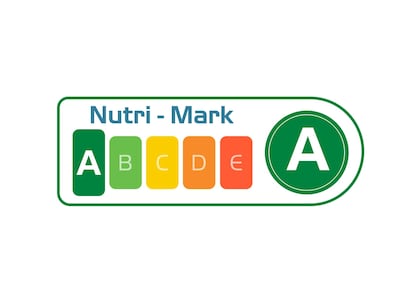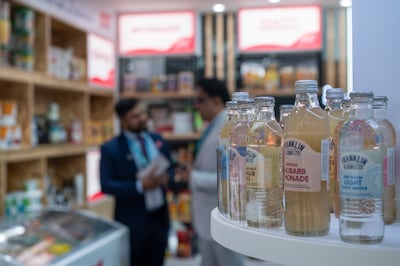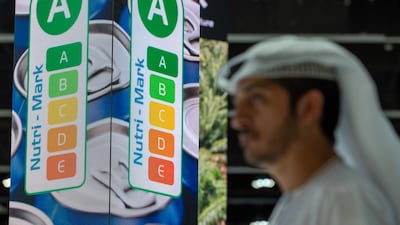Some food sold in shops across Abu Dhabi must include a new nutritional grading system on their packaging from June next year, authorities said on Tuesday.
The Nutri-Mark system ranks how healthy food is using letters A to E – with A having the highest nutritional value and E having the lowest. The grades will initially apply to dairy products, oils, beverages, baked goods and children’s food such as cereals and snacks. The system will eventually include all food sold in the emirate.
If items fail to meet standards or labelling is inaccurate, they will be withdrawn from the market. Existing goods have six months to update their current packaging. The labels are valid for a year and manufacturers importing new products have been encouraged to apply now for the label, officials added.
Dr Ahmed Al Khazraji, acting director general of Abu Dhabi Public Health Centre, said high obesity rates meant it was necessary to add nutritional grades to food.
"Up to 61 per cent of the population are either overweight or obese, and 22 per cent are confirmed obese," he said. "And when we look at children, which is even more concerning, 37 per cent are overweight or obese, with 18 per cent confirmed obese. Now, honestly speaking, the numbers are probably higher because these are only people who engage with the healthcare system. These are very concerning numbers."
He added that the financial figures associated with obesity are "terrifying".

International trend
"Obesity is not just a problem here – this is a global issue," he said. "When you consider that 15 per cent of the global population will one day be obese, the trajectory is simply unsustainable and it’s something we have to act on today."
In 2030, it is projected that 1.2 billion people around the world will be obese, the UN has said. "This is a daunting, scary number – 15 per cent of the world's population," Mr Al Khazraji added. "Obesity has significant health impacts, 30 to 35 per cent of deaths are attributable to high BMI. It causes infertility and affects cognitive performance in students and adults. This is something we certainly need to tackle.
"Very importantly, tackling this topic is not just a health issue, it’s a UAE community issue. By the time the health sector gets involved, it’s already too late. That’s why we are addressing this through a whole-of-government approach. I want to be very clear about one thing: these numbers are not just estimates or extrapolated from some global report. They are based on Abu Dhabi figures."
The announcement was made during the Abu Dhabi International Food Exhibition, which runs until November 28 at the Abu Dhabi National Exhibition Centre.

Making life easier
The new labels are designed to be clear and effective at showing how healthy food is. "What’s beautiful about the Nutri-Mark is that it’s very simple," Mr Al Khazraji said. "It’s easy to read and understand, which is critical. It empowers people to make informed choices.
"We’re not stopping anyone from buying anything – they can buy whatever they want – but at least they are informed. They know what they are buying, what they are putting into their bodies and how that impacts them."
Abdulla Al Muaini, executive director of the central testing laboratory at the Abu Dhabi Quality and Conformity Council, said it started work on the project a few months ago.
"The main goal is to address the global obesity pandemic," he explained. "We believe that with the Nutri-Mark, we will empower consumers to make informed decisions."
It is part of a larger initiative to make food products healthier, he added, as the project will focus on the "reformulation of food products" to encourage producers to adhere to healthier standards. Labs will offer support to manufacturers aiming to make their products healthier, while preserving taste and quality.
"One of our key performance indicators is measuring how effectively we can encourage the industry to reformulate their products to achieve better ratings," Al Muaini said. "The better the grade, the closer we are to achieving our target of improving the sector overall."
Abdulla Al Yazeedi, acting secretary general of the Abu Dhabi Quality and Conformity Council, said the launch of the initiative “marks a pivotal moment in setting new standards for food labelling, promoting greater transparency and accountability in the industry".
"By bringing together key retailers, food manufacturers and partners from government, industry and education, we are driving a shared commitment to raise awareness and empower consumers to make better, health-conscious choices," he added.

